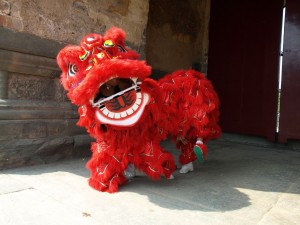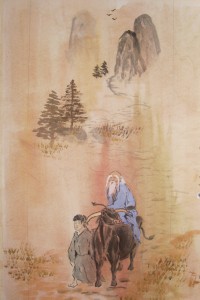Illusions of Power
 On the subject of internal arts and the effects of emotions, I’d like to talk about anger a bit. It is the emotion that I am most aware of struggling with in my own training, and I see it every day in others.
On the subject of internal arts and the effects of emotions, I’d like to talk about anger a bit. It is the emotion that I am most aware of struggling with in my own training, and I see it every day in others.
I think the allure of anger is that anger feels powerful. When the world is not as we want it to be, or we don’t like how we are treated by others, it is comforting to feel we are kings, as if our displeasure has the ability to reform things to our liking. When we are angry, we do not feel helpless, we do not feel vulnerable.
For an example of anger, let’s consider weapons shop vendors here in Wudang. My classmates and I are learning spear, so the other day I had to go to one of these shops. I struggle to finance my training, and I can not afford to throw money around carelessly on anything. However, it is standard practice in these shops that when a foreigner walks in the first quote rockets up above %1,000 and no amount of haggling will lower it to any realistic value (I am not exaggerating, and thank the rich, gullible tourists for that). Despite my best efforts, the best price I could get was 70 yuan, down from an original quote of 110 yuan, while my Chinese kungfu brother walked out of the store with the same spear for 20 yuan.
This makes me angry, and in my anger I feel righteous. I think, ” They’ll regret making me angry. My friends and I will never shop there again. I’ll write a blog about these jerks and ruin them internationally. I ought to go back there and throw a brick through the window of the shop, I’ll… I’ll…” But reality sets in and each of these angry thoughts is revealed as pointless and wrong. I will have to go back to that crook the next time I need a new weapon. My friends will do the same. Gouging customers is how these guys make their living, and no one blinks at it. That brick, though tempting, would be cowardly, petty, and probably make a lot of trouble for me, my master, and other foreigners in the area. Once I have left the store with my purchase, I am every bit as powerless as I feel. My anger does violence to me, and that vendor doesn’t lose any sleep at all.
Truly that vendor is part of my training, a sparring partner of sorts. I have to accept the fact that he is part of a system that is so much larger than me that I can not fight it. What can I do? I must proceed in a yielding way. I can try to learn to haggle better. I can make friends and they can shop on my behalf. I can be thankful that as a white American male, I have been given an opportunity to understand discrimination and compassion as I would never have understood it had I stayed in my own culture. But most importantly, I have to learn that though is nice to imagine myself as a king in my castle, inviolable and potent, there will always be forces in this world greater than me and lesser than me. And regardless of my actual ability to change my surroundings, I must be able to relate to them with tranquility. Thus, China itself tempers me.
I sometimes worry about how I will someday teach these lessons to Americans at home, where everyone tells you you can, “have it your way.” Anyway, more next time.
And if, in the unforeseeable future, I find myself in charge of regulating commercial tourism practices in Wudang, that salesman had better keep his head down ;-p.
Life Skills: Trustworthiness – The Definition

Each month we define and discuss a word of character development and life skill with all of our students.
This month the word is Trustworthiness and will be defined this way.
Young students: Trustworthiness means, “You can count on me, to do the right thing.”
Older students: Trustworthiness means: Worthy of trust by being Reliable, Accountable and Dependable. (RAD)
Here are the worksheets for our students:
Trustworthiness Project Tiger Tot
Trustworthiness Project 5-6 year olds
Trustworthiness Project Teen : Adults
If you would like to see how we will talk about TRUSTWORTHINESS with our students please follow our discussions here during the month of May or come in and TRY A CLASS.
Life Skills: Legacy – How We Behave is How We Will Be Remembered

Our legacy or how we are remembered is a day by day, place by place, person by person event. If we are the guests of someone in their home and are disrespectful or leave a mess – that person will remember us for that event. If we are in school and we are good listeners and work hard and are conscientious about our school work – that is how that teacher will remember us. Many of us have had our older brother or sister go ahead of us in school and even what they are remembered for is expected from us – good or bad.
How we behave is how we will be remembered and how we are remembered is about our character. Persons with good character have good principles that they live by. They believe in honor, integrity, duty, justice and other ethical values. They live up to those values because of two other qualities namely, conscious and courage. Conscious is our internal voice that reminds us of our moral obligations and courage helps us to do the right thing even when the cost is high, risky or unpleasant.
No matter whether we are parents or children we will be remembered by the character we display, both in the good times and the difficult. As parents though we are molding the children’s character everyday and every minute. The choices that we make create our legacy and affect the way our children will create their own legacy. The same is true if we are the older child in the family. So when we make a choice we might want to do it with the question in our mind, What would we do if our child was watching us, or our parents are watching us or our sibling was watching us?
Is this action one that I would like to be remembered for by those around me and that are so important to me?
Kungfu Blog
 Lately as I think about what I want to write in my blog, my ideas seem to move in a more philosophical direction. I hope that I can still provide anecdotal illustrations of life in China, but for the next few months I expect I will be writing more about what I am thinking related to my training. First, however, I feel like I need to lay some groundwork for this kind of thing.
Lately as I think about what I want to write in my blog, my ideas seem to move in a more philosophical direction. I hope that I can still provide anecdotal illustrations of life in China, but for the next few months I expect I will be writing more about what I am thinking related to my training. First, however, I feel like I need to lay some groundwork for this kind of thing.
First, I want to reiterate that what you read in this blog is distorted by the imperfect lens that is me. What you read here is not a faithful record of my master’s teachings or Daoist practice or Wudang martial technique. I am a student working through some rather difficult lessons, and you are reading the flotsam and jetsam of that learning process. I am likely to be wrong, or at least incompletely correct.
Second, the nature of my training is in essence unintellectual. By writing a blog about it, I bring it into the intellectual realm, but it can not be entirely expressed here. Language bridges the gap between your mind and mine, but this training is a thing of bone and muscle and character, not of the mind, and only a shadow of it can cross that bridge. It’s an common mistake to think once you have read and understood some piece of martial arts theory, you understand martial arts.
So if you read my blog and like what I am talking about, please remember: practice is what makes this stuff real, not comprehension. The Chinese say, “Kungfu equals time plus sweat,” and that is just as true for internal martial arts as external. Reading is fine, but training is what it’s all about. And that training should be monitored by a good teacher, not a blog.
Phew! 🙂 Now that I feel like we won’t fall into the more common pitfalls of this type of writing, I can get on with it…
